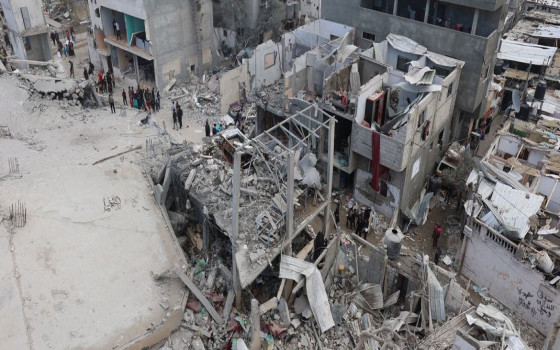
Iran and Israel exchange airstrikes, and casualties are mounting. Will the strikes change the equation of the war in Gaza?

- Europe and Arabs
- Saturday , 14 June 2025 8:49 AM GMT
Tehran - Brussels: Europe and the Arabs
In a pivotal shift that could redraw the map of confrontation in the region, Israel launched a large-scale attack on strategic sites inside Iran at dawn on Friday, targeting military and nuclear facilities and killing several senior Revolutionary Guard commanders, along with nuclear scientists. This sudden escalation is not separate from the context of the war in Gaza; rather, it is one of its most significant repercussions, according to a report by the European news network in Brussels, Euronews, which added, "The Israeli attack came at a time when Gaza is witnessing one of the bloodiest and longest rounds of war in years. Coinciding with this war and the Israeli strike on Iran, the Israeli army announced a significant reduction in the size of its forces deployed in the Strip and the redeployment of combat units to other fronts, in a clear indication of a reallocation of military priorities in light of the escalation with Iran." Observers believe that this step may translate on the ground into a relative decrease in the pace of ground operations in Gaza, but not a complete halt. This would see the Strip enter a phase of "temporary military calm," while threats remain, whether from the air or through limited operations in the border areas.
"Expanding the War" Instead of Ending It?
The Israeli strike on Iran raises questions about Tel Aviv's true intentions. Is Israel seeking to end the war in Gaza through external escalation? Or is it seeking to expand the scope of the war to include other parties? Targeting Tehran in this direct manner carries a dual message: one directed at Hamas, indicating that regional support for it will not be immune from deterrence, and the other directed at Iran itself, indicating that the confrontation is no longer confined to the Palestinian arena.
Hamas Responses and Solidarity with Iran
Amid these developments, the Islamic Resistance Movement, Hamas, issued a statement condemning the Israeli strike, describing it as a "dangerous escalation" that could detonate the entire region. Hamas asserted that Iran is "paying the price for its steadfast positions in support of the Palestinian cause." It also expressed its full solidarity with Tehran, offering condolences for the deaths of its leaders and scholars.
However, at the same time, Hamas and other factions have shown no indication of any intention to open new fronts, reflecting an awareness of the balance of power at this highly complex moment.
Gaza: Steadfastness Despite the High Cost
Despite the ferocity of the aggression and the multiplicity of fronts, Gaza remains the primary compass of the conflict. While Israel attempts to reposition itself militarily, the Strip suffers from a stifling humanitarian crisis and the ongoing loss of life and infrastructure. Observers fear that the people of Gaza will become secondary victims of a regional war that is expanding by the day.
According to experts, the Israeli strike on Iran indicates that the war is no longer confined to a single geographic area. If Gaza was the spark, the flames are beginning to touch other parties in the region, from Tehran and Beirut to Yemen and perhaps beyond. The fate of Gaza itself now depends on what is decided in military and political decision-making centers, not only in Tel Aviv, but also in various regional and international capitals.
In a dangerous escalation, Iran and Israel exchanged airstrikes targeting strategic military sites, resulting in deaths and injuries. Meanwhile, Trump called on Iran to return to the negotiating table.
Israel and Iran continue to carry out mutual airstrikes targeting multiple sites in both countries, in a dangerous escalation that is considered the most violent since tensions escalated between the two sides. The attacks have resulted in human and material losses on both sides.
Iranian state television reported that Iranian air defenses shot down an Israeli drone over the city of Salmas in West Azerbaijan Province, indicating that the drone was conducting reconnaissance missions over strategic sites.
For its part, the Israeli military announced that it had launched precision strikes against military facilities in the Iranian city of Isfahan, including a building for producing uranium ore, an infrastructure for converting enriched uranium, and research laboratories linked to the Iranian nuclear program. On the Iranian side, official media confirmed that the Iranian Revolutionary Guard launched a ballistic missile attack targeting Israeli sites in response to Israeli attacks on Iranian territory, without disclosing the nature of the targets or the consequences of the attack.
In this context, the Israeli Broadcasting Corporation reported that three Israelis were killed and approximately 90 others were injured as a result of Iranian missiles falling on several Israeli areas, while residents were forced to take shelter across the country.
US Ambassador to Israel Mike Huckabee said that the night was "tough," noting that he had to go to a shelter five times during the night due to Iranian shelling.
For his part, US President Donald Trump said in an interview with the Wall Street Journal that "Iran could have avoided all of this if they had agreed to a deal with the United States," adding, "They still have time to return to the negotiating table if they have something to negotiate."
Major powers in the region and around the world are monitoring the ongoing escalation with great concern, given the absence of any signs of an immediate de-escalation between the two arch-enemies.












No Comments Found